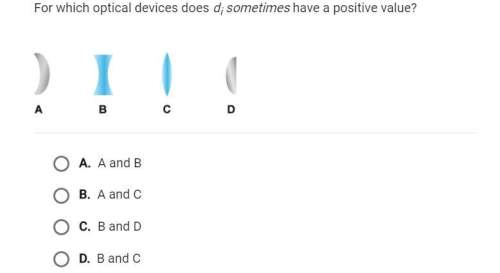
Physics, 01.08.2019 04:00 eddiewoods1935
When the ima is compared to ama in the real world, (a)the value of the ima is always larger than the ama (b)the value of the ama is always larger than the ima (c)the value of the ama is larger than the ima when there is no resistance (d)the value of the ima is larger than the ama when there is no resistance

Answers: 2


Another question on Physics

Physics, 22.06.2019 07:00
The seven sisters, seven stars located more than 400 light-years away in the taurus constellation can be seen here with venus and another constellation, orion. the seven stars stay grouped together but seem to move, like the planet venus. why do stars seem to move like planets in the night sky?
Answers: 3

Physics, 22.06.2019 15:40
Question 1 what is amperage? is the rate of doing work. is the rate of flow of protons in electric current. represents the amount of pressure behind electron flow. is the rate of flow of electrons in electric current. 2 points question 2 what is voltage? is the rate of doing power. represents the amount of pressure behind electron flow. is the rate of doing work. is the rate of flow of electrons in electric current. 2 points question 3 what is power? is the rate of flow of protons in electric current. is the rate of flow of electrons in electric current. is the rate of doing work. represents the amount of pressure behind electron flow. 2 points question 4 if we multiply volts times amps we get what? power circuit work current 2 points question 5 what are two ways alternating currents are similiar? in both ac and dc electrons flow in the same pattern. in both ac and dc, the flow of electrons changes directions back and forth. both ac and dc are only possible in certain materials with atoms that will allow electron flow. both ac and dc involve the flow of electrons. 4 points question 6 how does the flow of electrons flow in an alternating current? the flow of electrons is always slower in an alternating current than within a direct current. the flow of electrons is not constant and forward; it changes direction back and forth. electrons flow from from a higher affinity to that of a lower affinity. electron flow is constant and only in a forward direction. 2 points question 7 what is the flow like in a direct current? the flow of electrons is not constant and forward; it changes direction back and forth. the flow of electrons is constant and only in a forward direction. the flow of electrons go from a higher affinity to a lower affinity. the flow of electrons are always faster in a direct current. 2 points question 8 how is an electric current able to flow? electrons flow from the higher affinity to lower affinity and electrical current is generated. protons flow from the higher affinity to lower affinity and electrical current is generated. the movement of protons from one atom to another leads to an electric charge. the movement of electrons from one atom to another atom in a line results in a flow of electric current. 2 points question 9 how do electrons move from the two different types of metal in a battery? protons flow from the metal with the lower affinity to the metal with higher affinity and electrical current is generated. electrons flow from the metal with the lower affinity to the metal with higher affinity and electrical current is generated. electrons flow from the metal with the higher affinity to the metal with lower affinity and electrical current is generated. protons flow from the metal with the higher affinity to the metal with lower affinity and electrical current is generated.
Answers: 2

Physics, 22.06.2019 18:00
The photo shows sugar dissolved into a solution with excess sugar at the bottom of the jar this type of solution is classified as a. unsaturated b. compound c. saturated d. plasma
Answers: 1

You know the right answer?
When the ima is compared to ama in the real world, (a)the value of the ima is always larger than th...
Questions


World Languages, 10.10.2019 20:00

History, 10.10.2019 20:00









Mathematics, 10.10.2019 20:00











